The Maestro: King of the Cowboy Artists Blu-ray Movie
HomeThe Maestro: King of the Cowboy Artists Blu-ray Movie 
Criterion | 1994 | 53 min | Not rated | No Release Date
Price
Movie rating
7 | / 10 |
Blu-ray rating
| Users | 0.0 | |
| Reviewer | 4.0 | |
| Overall | 4.0 |
Overview
The Maestro: King of the Cowboy Artists (1994)
A documentary about Gerald "The Maestro" Gaxiola, who turned to a life of prolific art making after years as an aircraft mechanic, traveling salesman, and bodybuilder.
Director: Les Blank| Documentary | 100% |
Specifications
Video
Video codec: MPEG-4 AVC
Video resolution: 1080p
Aspect ratio: 1.33:1
Audio
English: LPCM Mono (48kHz, 24-bit)
Subtitles
None
Discs
50GB Blu-ray Disc
Single disc (1 BD)
Playback
Region A (locked)
Review
Rating summary
| Movie | 4.0 | |
| Video | 4.0 | |
| Audio | 4.0 | |
| Extras | 2.0 | |
| Overall | 4.0 |
The Maestro: King of the Cowboy Artists Blu-ray Movie Review
Reviewed by Jeffrey Kauffman July 7, 2019 Note: This film is available as part of Les
Blank: Always for Pleasure.
Chances are that unless you have a specialized interest in some of the indigenous folk music(s) of the United States, your recognition of the name
Les
Blank, if indeed you recognize it at all, may well come courtesy of
Burden of Dreams (note that the link points to a DVD, not a Blu-ray), Blank’s fascinating documentary about the filming of Werner
Herzog’s Fitzcarraldo. That piece was actually kind of an
outlier in Blank’s oeuvre, a large body of work that otherwise tended to focus primarily on musicians (though there are a couple of
exceptions in this set). Criterion’s collection of fourteen Blank
documentaries may understandably be thought of as a niche product, but for those interested in this subject, it’s a virtual smorgasbord of great
performances and at least some biographical data.
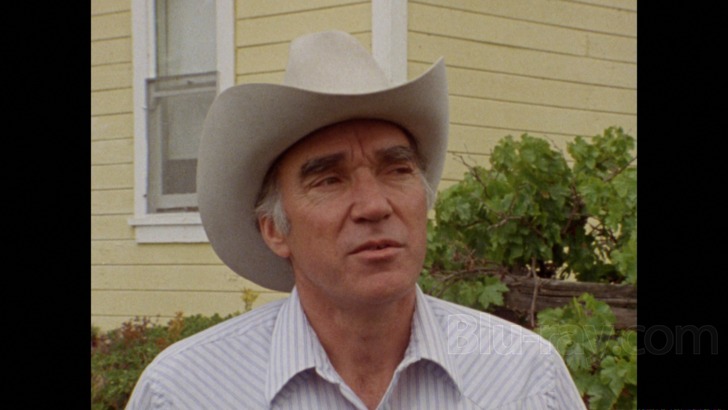
The Maestro: King of the Cowboy Artists might reasonably be seen as the "flip side" of sorts to Blank's A Well Spent Life (also included in this set), since it documents a musician who evidently couldn't care less about making a "real" living. Gerald Gaxiola is a fascinating individual, as evidenced by this piece, but he's a "sidewalk philosopher" who doesn't seem to buy into (pun intended) the whole Capitalist idea of making oodles of money. He therefore performs as a "Rhinestone Cowboy", not making much moolah, but evidently having one heck of a time in the process.
The Maestro: King of the Cowboy Artists Blu-ray Movie, Video Quality 
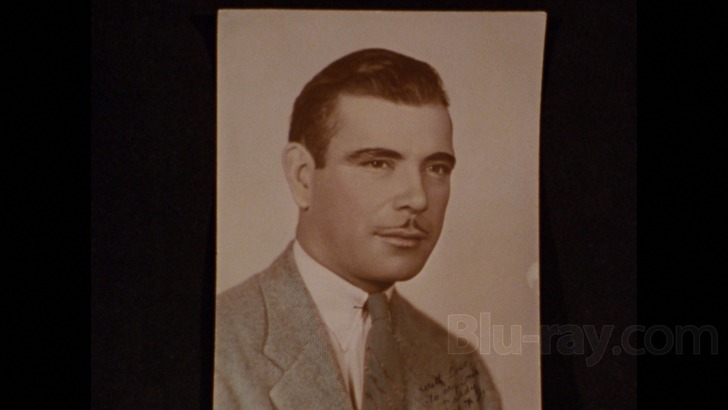
The Maestro: King of the Cowboy Artists is presented on Blu-ray courtesy of the Criterion Collection with an AVC encoded 1080p transfer in
1.33:1.
Criterion's insert booklet has the following information on the transfers in this set:
All fourteen films are presented in their original aspect ratio of 1.33:1. On widescreen televisions, black bars will appear on the left and right side of the image to maintain the proper screen format. These new digital transfers were created in 2K resolution on a Scanity film scanner from internegatives at Technicolor Los Angeles. Thousands of instances of dirt, debris, scratches, splices, warps, jitter, and flicker were manually removed using MTI's DRS and Pixel Farm's PFClean, while Digital Vision's Phoenix was used for small dirt, grain, and noise management.Perhaps due to its relatively "new" release date (1995), this is one of the nicer looking transfers in this set. Grain resolves naturally throughout, and detail levels are consistently very good to excellent. There is a sequence culled from some home video that starts at circa 18:10 that has a pretty abrupt falloff in quality, but the actual filmed sequences look very good here, with a vivid palette and nice fine detail.
The Maestro: King of the Cowboy Artists Blu-ray Movie, Audio Quality 
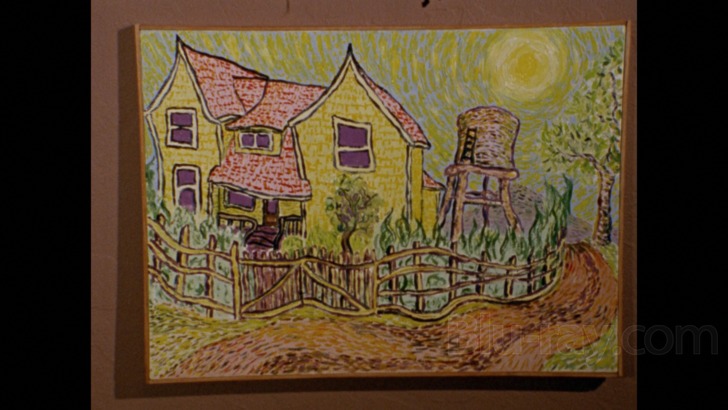
Criterion's insert booklet has the following information on the soundtracks:
The original monaural soundtracks for The Blues Accordin' to Lightnin' Hopkins; A Well Spent Life; Dry Wood; Always for Pleasure; Garlic is as Good as Ten Mothers; Sprout Wings and Fly; In Heaven There is No Beer?; Gap-Toothed Women; Yum, Yum, Yum! A Taste of Creole and Cajun Cooking; and The Maestro: King of the Cowboy Artists were remastered at 24-bit from 35 mm full-coat magnetic tracks. The original monaural soundtrack for Hot Pepper was remastered at 24-bit from the original 16 mm full-coat magnetic track. The original monaural soundtrack for God Respects Us When We Work, but Loves Us When We Dance was remastered at 24-bit from a restored DA-98 tape and the restored 35 mm full-coat magnetic track. The original monaural soundtrack for Spend It All was remastered at 24-bit from a restored WAV file. And the original stereo soundtrack for Sworn to the Drum: A Tribute to Francisco Aguabella was remastered at 24-bit from the original 16 mm full-coat magnetic track. Clicks, thumps, hiss, hum, and crackle were manually removed using Pro Tools HD, AudioCube's integrated workstation, and iZotope RX3.The Maestro: King of the Cowboy Artists features an enjoyable LPCM Mono track which handles both music and spoken elements effortlessly. This is another outing where some of the live performances seem to have been piped through less than state of the art house sound systems, and so there are some variances that devoted audiophiles will probably notice, but nothing that I'd term overly problematic.
The Maestro: King of the Cowboy Artists Blu-ray Movie, Special Features and Extras 
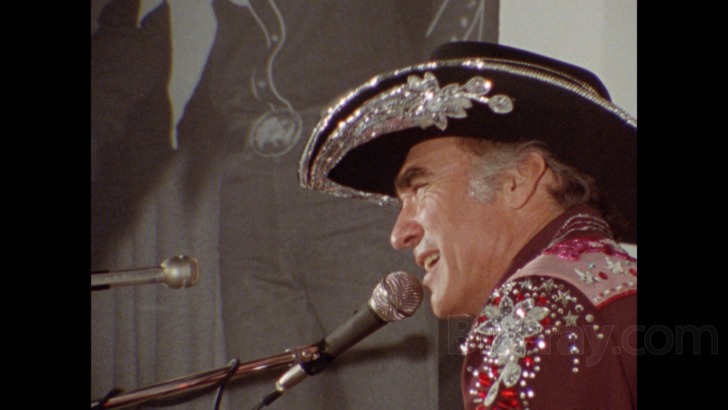
- The Maestro Rides Again! (1080i; 29:00) is a 2005 sequel of sorts by Blank.
- The Maestro (1080p; 12:31) is an interview with Gerald Gaxiola, who discusses Blank and the shooting of the film.
- Art for Art's Sake (1080p; 6:58) features another interview with Chris Simon.
The Maestro: King of the Cowboy Artists Blu-ray Movie, Overall Score and Recommendation 
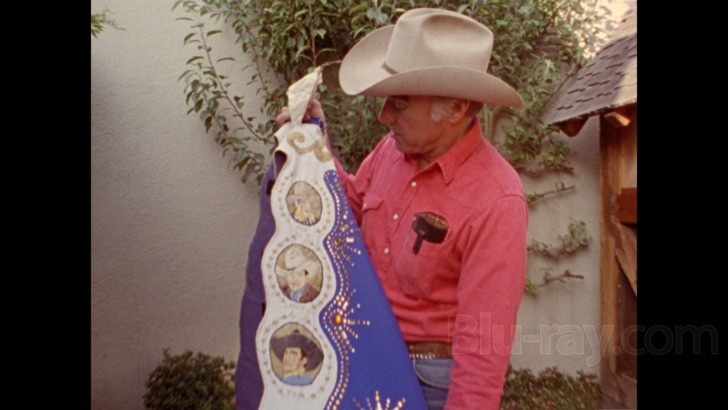
As a guy who has attempted to make at least part of his living with music, I found this documentary to be hugely appealing, if only because Gaxiola seems to be so content to favor Art over Commerce. This documentary has some of the best overall technical merits of the entire Blank set, and the supplements are similarly excellent. Highly recommended.
Similar titles
Similar titles you might also like
(Still not reliable for this title)

Gap-Toothed Women
1987

Garlic Is as Good as Ten Mothers
1980

Yum, Yum, Yum! A Taste of Cajun and Creole Cooking
1990

In Heaven There Is No Beer?
1984

Hot Pepper
1973

Dry Wood
1973

Spend It All
1971

Sworn to the Drum: A Tribute to Francisco Aguabella
1995

Sprout Wings and Fly
1983

God Respects Us When We Work, but Loves Us When We Dance
1968

A Well Spent Life
1971

Always for Pleasure
1978

The Blues Accordin' to Lightnin' Hopkins
1968

Vernon, Florida
1981

The Story of Film: A New Generation
2021

La Soufričre
1977

Color Adjustment
1992

Black Is... Black Ain't
1995

And Everything Is Going Fine
2010

Ballad of the Little Soldier
Ballade vom kleinen Soldaten
1984